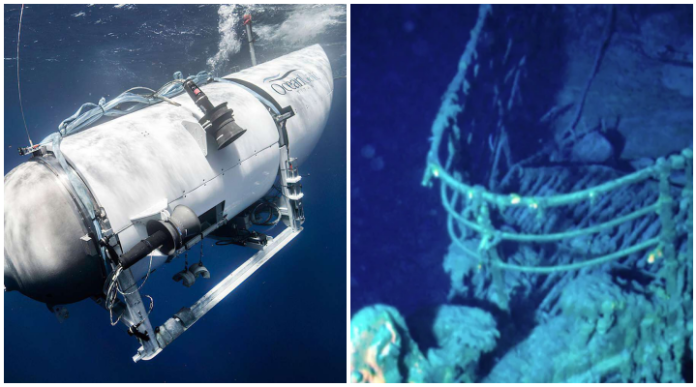As per reports, OceanGate's carbon fiber hull was unsuited for dives into such depths. In a video now going viral, CEO Stockton Rush is seen admitting that he knows there are issues, but he is taking the risk anyway.

OceanGate's sub Titan, (L), wreck of the Titanic on the seafloor (R)
The HMS Titanic had sunk on April 15, 1912, taking more than 1500 people with it. 111 years later, 4 high-profile passengers and the CEO of the OceanGate company, who was the pilot of the tourist submersible ‘Titan’, died after their sub imploded due to extreme pressure deep in the North Atlantic Ocean.
The US Coast Guard has confirmed that one of their ROVs from the vessel Horizon Arctic located the debris of a tail comb from the OceanGate sub-Titan approximately 1600 feet from the bow wreckage of the Titanic on the seafloor. Other debris was also found scattered in the general area. The debris was confirmed to be from Titan, the lost tourist sub from OceanGate.
Speaking to the media, OceanGate’s co-founder Guillermo Stohnlein said that in the case of any failure, the implosion would have been instantaneous.
It is notable here that the Titanic wreckage sits at a depth of around 3800 meters. As per reports, the implosion at a depth like that causes immediate crushing of the vessel and everything inside it. The pilot and the passengers would have died within a few milliseconds.
CEO of OceanGate was the pilot, the 4 passengers included the billionaire explorer Hamish Harding, a British-Pakistani father-son duo named Shahzada Dawood and Suleiman Dawood, and the popular ‘Mr Titanic’ Paul-Henry Nargeolet. Nargeolet, a French Navy veteran, was part of the first expedition to visit the wreck in 1987, just two years after it was found. He has earned the moniker ‘Mr. Titanic’ as he has reportedly spent more time at the wreck than any other explorer.
The deceased CEO’s wife is a descendant of an old couple who died in the Titanic disaster in 1912
Wendy Rush, the wife of OceanGate CEO Stockton Rush, is the great-great-grandaughter of Isidor and Ida Straus, an old couple who had perished in the Titanic disaster in 1912. The old couple was depicted in James Cameron’s Oscar-winning movie too.
Isidor and Ida Straus were first-class passengers who had refused to board a lifeboat and had gone down with the ship on that fateful night in 1912.
Titanic tours
Tourists spend thousands of dollars to be taken to the wreckage of the liner, 12,500ft underwater. It is claimed that OceanGate Expeditions charges $250,000 (£195,270) for a place on its eight-day expedition.
It is important to note that submersibles are different from submarines. A submersible needs a mother ship that can launch it and recover it. Contrary to it, a submarine has enough power to leave port and come back to port on its own.
37 years ago, the wreckage of the Titanic was discovered in the Atlantic, around 400 nautical miles from Newfoundland, Canada. A team led by legendary explorer Robert Ballard had found the vessel.
OceanGate sub had ‘quality’ issues
As per reports, OceanGate’s carbon fiber hull was unsuited for dives into such depths. In a video now going viral, CEO Stockton Rush is seen admitting that he knows there are issues, but he is taking the risk anyway.
On Sunday morning, the surface crew of the accompanying tug boat had lost contact with the submersible one hour and 45 minutes after it went down the sea.
OceanGate staff had confirmed that in addition to a very limited oxygen supply, those onboard will also be experiencing frigid temperatures.
As per reports, David Lochridge, former director of marine operations associated with OceanGate, had refused to greenlight the sub, citing that the viewport is only certified to withstand pressure up to the depth of 1300 meters. The wreckage of the Titanic sits at a depth of 3800 meters on the ocean floor.
Lochridge was fired by OceanGate later. Months later, over 3 dozen people from the industry, including deep sea explorers and oceanographers included, had voiced concerns and warned the company of potential ‘catastrophic problems’ with their tours using that sub. Lochridge had also stated that OceanGate was unwilling to have the sub inspected and certified by established agencies.
Phew, I wonder if the rich people really understood the dangers.
The CEO/Pilot won't get much compassion from me, I think he was told be enough people that the vehicle wasn't safe for the job.
Not sure how much of that was communicated to the passengers though.
I know they had to sign a waiver, but you have to do that for a lot of things that are much more safe.
Importantly, waivers don’t cover negligence or fraud.
Catastrophic failure is always a possibility, and liability can be waived if the vehicle is inspected and certified and fails when operating within the certified parameters. The liable party did their due diligence to ensure that all regulations and certifications were followed. Passengers can give informed consent to the risks and waive liability.
Liability cannot be waived if you lie about the vehicle or the activity. If it was only certified to 1300 meters and they told passengers that it was good for the full depth, that’s fraud and the passengers couldn’t have given informed consent to waive liability. If they lied about the depth the submersible would be going to and that depth being outside the range of the certification, the passengers can’t give informed consent to that risk.
You would think they would have done some research before setting out on a trip like this though. Maybe I have a different mindset, but if I was about to embark on something like a submarine tour I would have been looking up everything I could on the company. A quick Google search would have shown them the problems that the company had experienced in the past and the criticisms leveled against them by experts.